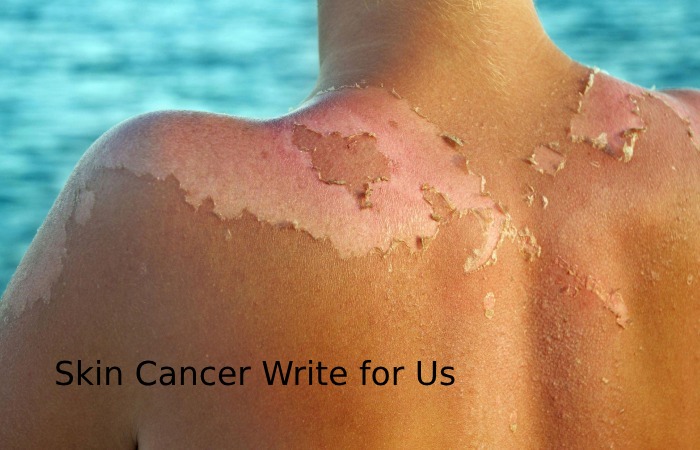Skin Cancer Write for Us
Skin Cancer Write for Us – Melanoma — the abnormal growth of skin cells — often develops on sun-exposed skin. But this common type of cancer can also occur in areas of your skin that aren’t generally exposed to the sun.
The three most common kinds of skin cancer are basal, squamous, and melanoma. Your risk of acquiring skin cancer can be reduced or even eliminated by limiting or eliminating your exposure to ultraviolet (UV) light. The early identification of skin cancer can be helped by checking for unexpected changes in your skin. If skin cancer is detected early, your chances of successfully treating it are greatest.
Describe skin cancer.
Skin cancer is a disease that involves the growth of abnormal cells in the skin tissue. Usually, when skin cells age and die, new cells form to take their place. When this process isn’t working as well as it should—such as after exposure to ultraviolet light from the sun—cells grow more quickly. These cells may be non-cancerous (benign), which do not spread and do no harm. Or it may be cancerous.
Skin cancer can spread to nearby tissues or other body areas if not caught early. Fortunately, most are cured if skin cancer is identified and treated in its early stages. Therefore, you must talk to your healthcare provider if you have any signs of skin cancer.
Types of skin cancer
There are three main types of skin cancer:
Basal cell carcinoma forms in the basal cells in the bottom part of your skin (the outer layer).
Squamous cell carcinoma forms in the squamous cells in the outermost layer of the skin.
Skin cancer is disease that develops in melanocytes. Melanin, a brown pigment that gives our skin its color and shields it from part of the sun’s damaging UV rays, is produced by melanocytes. Skin cancer is the most hazardous since it can spread to other body parts. One of several types of skin cancer is Kaposi sarcoma. Merkel cell tumor. The sebaceous gland cancer. cutaneous fibrosarcoma of tuberculosis. What causes this situation?
Excessive sun exposure is the main contributor to skin cancer, especially when blisters and sunburns develop. The sun’s UV rays harm your skin’s DNA, which forms aberrant cells. These unusual cells proliferate quickly and uncontrollably to produce an accumulation of malignant cells.
What tests will be done to diagnose skin cancer?
Your doctor may do a biopsy if they suspect skin cancer. During a biopsy, a tissue sample is taken and transported to a lab so that a pathologist may study it under a microscope. Your dermatologist will identify the type of melanoma you have, establish
whether the skin lesion is one, and discuss your treatment choices. What are the stages of skin cancer?
The cancer’s stage tells you how far it has progressed throughout your body. Steps 0 through IV of skin cancer can occur anywhere. The tumor is more extensive and more challenging to cure the larger the number. But the melanoma stage is different, unlike non-melanoma skin malignancies that begin in the basal or squamous cells.
How to Submit Your Articles?
That is to says, to submit your article at www.In Health Blog.com, mail us at contact@inhealthblog.com
Why Write for In Health Blog – Skin Cancer Write for Us

- Writing for In Health Blog can give massive exposure to your website for customers looking for Health.
- In Health Blog presence is on social media, and we will share your article for the Health related audience.
- You can reach out to Health.
Search Terms Related to Skin Cancer Write for Us
Skin cancer – Symptoms and causes
Skin Cancer: Symptoms, Types & Treatment
Skin Cancer Information
What Is Skin Cancer? Causes, Pictures, Types, and More
Skin cancer
Skin Cancer Image Gallery | Photos of Skin Cancer
Skin Cancer (Non-Melanoma): Introduction
Skin Cancer Types, Symptoms & Information
Basic Information About Skin Cancer
What Skin Cancer & Precancerous Lesions Look Like
Skin cancer (non-melanoma)
Skin Cancer – StatPearls
Skin Cancer Symptoms & Signs
Skin cancer (non-melanoma) – Illnesses & conditions
What Are the Different Types of Skin Cancer?
Skin Cancer Symptoms: ABCDE Signs and What It Looks Like
Skin cancer | Causes, Symptoms & Treatments
Skin Cancer | Basal Cell Carcinoma
Skin cancer statistics
Ultraviolet (UV) radiation and skin cancer
Search Terms for Skin Cancer Write for Us
Skin Cancer Write for Us
Write for Us Skin Cancer
Skin Cancer Guest Post
Guest Post Skin Cancer
Skin Cancer Contribute
Contribute Skin Cancer
Skin Cancer Submit Post
Submit Post Skin Cancer
Skin Cancer submit an article
Submit an article Skin Cancer
Skin Cancer become a guest blogger
A guest blogger Skin Cancer
Skin Cancer writers wanted
Wanted writers Skin Cancer
Skin Cancer suggest a post
Suggest a post Skin Cancer
Skin Cancer guest author
Guest author Skin Cancer
Article Guidelines on In Health Blog – Skin Cancer Write for Us
- We at In Health Blog welcomes fresh and unique content related to Health.
- In Health Blog allow a minimum of 500+ words related to Health.
- The editorial team of In Health Blog does not encourage promotional content related to Health.
- For publishing article at In Health Blog email us at contact@inhealthblog.com.
- In Health Blog allows articles related to Health, Diet, Diseases, Skin, Beauty, Technology, Products, etc.
Related Pages
Dentistry Assistant Write For Us
Innovations in Healthcare Write for us
Interior Designer Write for us
Fashion And Beauty Write for Us
Health and Wellness Write for Us
Occupational therapy write for us
Pathogens Disease Write for Us
Coronary Artery Disease Write for Us

